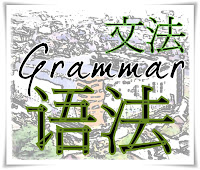不用...,只要...就...了
dont need to..., just to...then it will be ...
for example 例子 [contohnya] :
- 你不用怕不能進去電影院,只要帶上電影票就行了
- 其實我們不用跟別人相比, 只要用功讀書妳就會得到高分了
- 做文章不用多麼完美,只要妳寫得很生動就可以了
- 爸爸的事業你不用多管,只要好好做你的工作部分我就放寬心了
- Nǐ bùyòng pà bùnéng jìnqù diànyǐngyuàn, zhǐyào dài shàng diànyǐng piào jiùxíng le
- Qíshí wǒmen bùyòng gēn biérén xiāng bǐ, zhǐyào yònggōng dúshū nǎi jiù huì dédào gāo fēn le
- Zuò wénzhāng bùyòng duōme wánměi, zhǐyào nǎi xiě de hěn shēngdòng jiù kěyǐ le
- Bà ba de shìyè nǐ bùyòng duō guǎn, zhǐyào hǎohǎo zuò nǐ de gōngzuò bùfèn wǒ jiù fàngkuān xīn le
- 你不用怕不能进去电影院,只要带上电影票就行了.
- 其实我们不用跟别人相比, 只要用功读书妳就会得到高分了.
- 做文章不用多么完美,只要妳写得很生动就可以了.
- 爸爸的事业你不用多管,只要好好做你的工作部分我就放宽心了.
- you no need to be scared of not allowed to get into the cinema, as long as you bring the ticket
- actually we no need to compare with other, as long as we study hard, we'll get high rank.
- write an article no need so perfect, as long as you can write a story vividly [as if it is real] then it is ok.
- you no need to take care father's business, as long as youdo well your part [your job], then i won't worry anymore.
word bank:
- 不能 = can not [are not allowed to]
- 電影院 = cinema
- 帶 = to bring
- 票 = ticket
- 行 = ok
- 其實 = actually
- 跟別人= with other people
- 相比 = to compare each other [do the comparison]
- 用功 = dilligent of study [study-hard]
- 讀書 = hit the book [learning]
- 會 = will
- 得到 = get / gain
- 高 = high
- 分 = 分數 Fēnshù = score [grade of examination]
- 做 = to make [to do]
- 文章 = article
- 完美 = perfect
- 寫 = to write
- 生動 = vividly [as if real]
- 可以 = ok, can, allowed
- 事業 = business
- 管 = to take care
- 好好 = well [indicate the action is done with good work] for example : you should learn well at class 你要好好上課
- 工作 = job
- 部分 = part
- 放心 = not worry [relieved]
See Also

Comments
Post a Comment